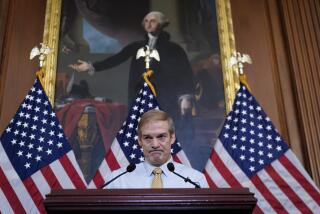A damning post-mortem of the financial meltdown
The public reaction to major man-made disasters always follows the same life cycle: First come shock and outrage, then demands for investigation and retribution against the guilty, and finally resignation about God’s mysterious ways, fatigue and ennui.
It may be the sad fate of the Financial Crisis Inquiry Commission to have issued its report on the recent economic disaster after popular sentiment had already reached that final stage. The commission, made up of six Democrats and four Republicans and chaired by former California Treasurer Phil Angelides, released its 633-page report on Jan. 27 to what amounted to a resounding public yawn.
That’s a shame, because it’s an invaluable chronicle of the worst global financial collapse since the 1930s. That doesn’t mean it’s perfect. As some critics have pointed out, the report isn’t as rigorously documented as it could be; it’s light on earthshaking disclosures, which are the red meat of any public inquiry; and it fails to make specific recommendations. This last isn’t the panel’s fault, as its founding directive from Congress forbade it from making specific recommendations.
It was also hampered by a profound partisan split among the commissioners. It’s hard to say who’s responsible for that. I will say that when I spoke last week with its vice chairman, Bill Thomas, the former Republican congressman from Bakersfield, he sounded a bit like he had a partisan chip on his shoulder from the start. “This had a typical partisan structure with a partisan outcome,” he told me.
Yet the commission’s general conclusion is important: The collapse was utterly foreseeable — there was no shortage of warnings from bankers, analysts and others in the credit and stock markets — but managements of major financial institutions and their regulators were unable or unwilling to act to halt or moderate imprudent behavior.
Nobody ever wants to turn down the music when the party is going full blast, which is why you want your regulators to be prim, pinched souls with grim eyes and a constitutional aversion to fun. Instead, the carousing banks were overseen by overmatched, indulgent fellow party animals.
“The people in charge of the system,” Angelides says, “allowed it to evolve in ways they didn’t understand and didn’t question.”
Bankers were playing with novel credit derivatives the risks of which they couldn’t calculate. When they got a hint they didn’t care. Former Citigroup Chief Executive Chuck Prince told the panel that it would not have “excited my attention” to learn his bank held $40 billion in mortgage securities. The joke’s on him: The firm’s loss of more than $8 billion when that portfolio went south helped cost him his job.
One of the awkward results of the commission’s partisan divide is that the final report comes in pieces — a huge block of majority findings and two dissents. One of the dissents is a joint statement by three Republican members and the other a wholly unconvincing effort by the fourth GOP member, Peter J. Wallison of the American Enterprise Institute, to blame the entire global meltdown largely on the U.S. government’s affordable-housing program.
The main report and the main dissent, as it happens, blame the crisis on a lot of the same causes. These include the assumption of too much risk by inattentive managements and the deterioration of credit standards, especially in the mortgage market.
“I was struck by the widespread poor risk management” by executives at major banks and other financial institutions, says Douglas Holtz-Eakin, a GOP appointee who is a former director of the Congressional Budget Office. “They were just so complacent. Jamie Dimon said, ‘We never thought housing prices would go down.’ Come on.” (Dimon is the chairman of JPMorgan Chase.)
The minority report emphasizes the global nature of the crisis to suggest that U.S.-only explanations or solutions — tighter regulation, say — aren’t adequate.
“In every single case where something went wrong, the majority says it went wrong because there wasn’t enough regulation,” says Keith Hennessey, a GOP appointee who is a former economic advisor to President George W. Bush.
Yet the dissenters seem to go out of their way to avoid laying blame on regulators, even where their dereliction is obvious. In listing “appallingly bad risk management” by top bank and Wall Street executives among the essential causes of the crisis, they observe that some failed institutions were leveraged at a perilous 35-to-1 ratio or higher. (Every $35 of assets comprised $34 in debt and but one dollar of equity.)
“These firms should have had much larger capital cushions,” the dissent states blandly, as though leverage ratios like this just sort of happened. The truth is that the leverage of financial institutions is subject to the say-so of their regulators. In every case leading up to the disaster, the regulators waved the higher leverage ratios through — even though the perils of a capital structure built like an upside-down pyramid were entirely predictable.
Of course, the financial institutions seeking the looser standards assured the regulators that they could handle the risk just fine. We know how that turned out.
Another cause identified by the dissenters is that credit rating agencies such as Moody’s and Standard & Poor’s “erroneously” rated bundled-up mortgage garbage “too highly.” The triple-A ratings the credit firms draped over crummy mortgage securities empowered Wall Street to buy and sell them as though they were gilt-edged. Labeling this merely as an “error” reminds me of the Steve Martin joke about what to tell the judge when you’re on trial for armed robbery: “I forgot armed robbery was illegal.” The line got a big laugh for Steve, and the line about “erroneous” credit ratings deserves a horselaugh from you.
The majority report is much better at nailing down this issue. The rating agencies sought lucre by turning themselves into assembly lines for triple-A ratings. On the average working day in 2006, Moody’s delivered its top rating to 30 mortgage-backed securities. About 83% of them were eventually downgraded.
The key here is that it was the securities’ packagers that paid the rating agencies’ fees, which gave the latter an incentive to shower even the foulest product with glitter. Although the rating agencies weren’t directly subject to regulation, they had to be registered by the SEC. More important, under Federal Reserve rules, the ratings of these securities governed how much capital a bank that owned them had to hold in reserve. That gave regulators a direct interest in the agencies’ incentives and credibility. Did they inquire? The answer is no.
Indeed, the most compelling finding of the majority report concerns the importance of aggressive, objective regulation, which was entirely lacking as the seeds of the financial crisis germinated into a forest of poisonous trees. The report observes that “mortal flaws like greed and hubris” can’t be legislated away, especially on Wall Street, where money has the capacity to cloud men’s minds.
The job of making sure that greed and hubris don’t reduce the economic landscape to ashes falls to the regulators. As the report documents in nauseating detail, at that job they failed spectacularly.
Michael Hiltzik’s column appears Sundays and Wednesdays. Reach him at mhiltzik@latimes.com, read past columns at latimes.com/hiltzik, check out facebook.com/hiltzik and follow @latimeshiltzik on Twitter.







